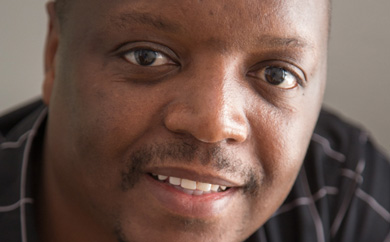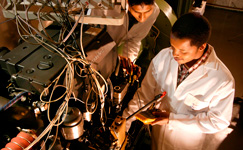Science and technology
South Africa's CSIR celebrates 70 years of research
Advertising campaign
Phase two of its advertising campaign started on 12 October, according to Tendani Tsedu, the group's spokesperson. "This is the first advertising campaign for the CSIR. We wanted to show the public how the work that is being done by the CSIR affects them on a daily basis," he explained. It falls under the Ideas that Work initiative. In one of the videos, the narrator asks the question: "What if there were people who were quietly working to make your life better, without you even knowing?" Watch one of the advertisements being shown on South African television channels till 10 December: Tsedu said the aim of the advertising was to show the impact of the CSIR's research on society, industry and other sectors. "Another factor (for the advertising) was to increase the visibility of the CSIR and also to attract young people towards science. We want them to know that science is fun and exciting." In just one recent innovation, in 2013 CSIR researchers developed the world's first digital laser. It was regarded as a milestone in laser technology and could spur future laser-related innovations. The team found that laser beams could be digitally controlled from within a laser device. Their findings were published in the prestigious Nature Communications journal, on 2 August 2013. Find out how to make the CSIR your career choice:The conference
The CSIR's 5th conference was attended last week by 1 500 delegates, said Tsedu. Guests included Deputy President Cyril Ramaphosa, Minister of Science and Technology Naledi Pandor, members of the science and technology portfolio committee, research partners such as Eskom, Transnet and the South African National Defence Force, and university students. Speaking on the first day, Ramaphosa said that continuous investment in research and development was critical for South Africa to achieve the goals of its National Development Plan (NDP). "The NDP says that science and technology must be used to address some of the problems in education, health and economic development, and it must facilitate access to information and knowledge," said Ramaphosa. Watch the deputy president explain why the government will invest in solution- driven technology:Research out of the lab
At the conference, CSIR scientists presented their work to the public. About 20 exhibitions covered energy, health, defence, built environment, ICT, natural environment and industry. Tendani Tsedu of CSIR said during their 5th Conference the scientists had
an opportunity to present their work to the public. (Image: Supplied)
"They
had a chance to take the research out of the lab and discuss it in an open
forum," said Tsedu. "The robust debates and engagement with the industry,
government departments, businesses and other science councils were inspiring and
constructive.
"Those who attended (the conference) now have a better idea of what is the
CSIR and how can they use science to solve issues that they are facing," he added.
Another highlight was the launch of a commercial product with Nestlé South
Africa. The CSIR teamed up with the Agriculture Research Council, Nestlé and
University of Fort Hare to develop Maggi 2 Minute Noodles with morogo, or African
spinach. This product, which is already available in supermarkets, is a good
example of what can be achieved if private and public companies work together to
address issues such as unemployment and poverty.
Delegates tweeted about the sessions:
Tendani Tsedu of CSIR said during their 5th Conference the scientists had
an opportunity to present their work to the public. (Image: Supplied)
"They
had a chance to take the research out of the lab and discuss it in an open
forum," said Tsedu. "The robust debates and engagement with the industry,
government departments, businesses and other science councils were inspiring and
constructive.
"Those who attended (the conference) now have a better idea of what is the
CSIR and how can they use science to solve issues that they are facing," he added.
Another highlight was the launch of a commercial product with Nestlé South
Africa. The CSIR teamed up with the Agriculture Research Council, Nestlé and
University of Fort Hare to develop Maggi 2 Minute Noodles with morogo, or African
spinach. This product, which is already available in supermarkets, is a good
example of what can be achieved if private and public companies work together to
address issues such as unemployment and poverty.
Delegates tweeted about the sessions:
@CSIR Dr Busisiwe Vilakazi is the last Health
speaker of the #CSIRConference #CSIR70 All speakers have been excellent pic.twitter.com/RudpOUeHin
—
Lyndi Jonker (@lyndi_j) October 9,
2015#CSIRConference . Really enjoying hearing about the great
research projects CSIR is doing. Makes me a proud South African
—
Barry Dwolatzky (@BarryDwolatzky) October 8,
2015@rulanho getting ready to demo some of
the cool apps entrepreneurs & innovators have built @mlabsa #csirconference
pic.twitter.com/pjbcDsKLiD
—
mLab Southern Africa (@mlabsa) October 8,
2015Interesting sessions
"The focus was on the research that the CSIR is doing to find a cure for malaria," Tsedu explained about the health session. The conference also looked at research on food to be used in school feeding schemes, e-health and "many other exciting work in this field". Prof Lynn Morris, the head of the HIV virology laboratories in the Centre of HIV and Sexually Transmitted Infections at the National Institute for Communicable Diseases, was a speaker. She gave a keynote address titled "Towards an antibody- based HIV vaccine." Source: South Africa.info reporter The Council for Scientific and Industrial Research is celebrating 70 years of research in 2015. It is known for innovations like the world's first digital laser. (Image: Media Club South Africa)
The Council for Scientific and Industrial Research is celebrating 70 years of research in 2015. It is known for innovations like the world's first digital laser. (Image: Media Club South Africa)
Related links
Related articles
- South African anti-poaching unit Champions of the Earth
- South African students urged to excel in maths and science
- South African team uncovers answers to the origin of turtles
- More professionals entering South Africa, than leaving
- New South African telescope to promote the sciences
- New growth for South African crop scientist




